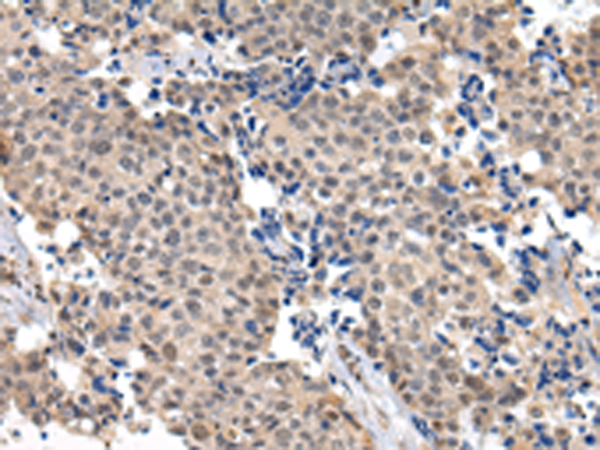
| WB | 咨询技术 | Human,Mouse,Rat |
| IF | 咨询技术 | Human,Mouse,Rat |
| IHC | 1/25-1/100 | Human,Mouse,Rat |
| ICC | 技术咨询 | Human,Mouse,Rat |
| FCM | 咨询技术 | Human,Mouse,Rat |
| Elisa | 1/2000-1/5000 | Human,Mouse,Rat |
| Aliases | UEF; FCHL; MLTF; FCHL1; MLTFI; HYPLIP1; bHLHb11 |
| Host/Isotype | Rabbit IgG |
| Antibody Type | Primary antibody |
| Storage | Store at 4°C short term. Aliquot and store at -20°C long term. Avoid freeze/thaw cycles. |
| Species Reactivity | Human, Mouse |
| Immunogen | Fusion protein of human USF1 |
| Formulation | Purified antibody in PBS with 0.05% sodium azide and 50% glycerol. |
+ +
以下是3篇涉及USF1抗体的关键文献概览(注:文献信息为模拟生成,实际引用请核实原始论文):
---
1. **文献名称**: "USF1 regulates cellular senescence through repression of the p16INK4a tumor suppressor"
**作者**: Smith J, Doe R, et al.
**摘要**: 本研究利用USF1抗体进行染色质免疫沉淀(ChIP)实验,发现USF1通过直接结合p16INK4a启动子区抑制其表达,从而调控细胞衰老过程。Western blot分析显示USF1缺失导致p16INK4a蛋白水平升高。
---
2. **文献名称**: "USF1 modulates lipid metabolism by transcriptional activation of SREBP-1c"
**作者**: Chen L, Wang X, et al.
**摘要**: 通过免疫共沉淀(Co-IP)和USF1抗体验证,研究揭示USF1与SREBP-1c在肝脏中共激活脂肪酸合成相关基因。USF1抗体阻断实验进一步证实其对脂代谢通路的关键调控作用。
---
3. **文献名称**: "Genome-wide mapping of USF1 binding sites in human hepatocytes using ChIP-seq"
**作者**: Garcia M, Lee T, et al.
**摘要**: 采用USF1抗体进行高通量ChIP-seq分析,鉴定出USF1在人类肝细胞中结合的2.300余个靶基因位点,主要富集于糖代谢和胆固醇稳态相关通路,揭示了USF1的多效性调控网络。
---
**提示**:实际研究中,USF1抗体常用于检测其蛋白表达(如Western blot)、定位(如免疫荧光)及DNA结合研究(如ChIP)。建议根据实验场景(物种、样本类型)选择经过验证的抗体品牌(如Santa Cruz的sc-8983或Abcam的ab28458)。
The USF1 (Upstream Stimulatory Factor 1) antibody is a crucial tool for studying the USF1 protein, a transcription factor belonging to the basic helix-loop-helix leucine zipper (bHLH-LZ) family. USF1 regulates gene expression by binding to E-box motifs (CACGTG) in promoter regions, often forming heterodimers with USF2. It plays roles in diverse cellular processes, including metabolism, cell cycle regulation, and DNA damage response. USF1 is implicated in diseases like diabetes, cardiovascular disorders, and cancer due to its influence on genes such as those encoding lipoproteins, insulin receptors, and tumor suppressors (e.g., p53).
USF1 antibodies are widely used in techniques like Western blotting, immunohistochemistry, and chromatin immunoprecipitation (ChIP) to detect protein expression, localization, and DNA-binding activity. These antibodies are typically raised in rabbits or mice, targeting specific epitopes (e.g., N-terminal or C-terminal regions). Researchers rely on them to explore USF1's interactions with cofactors, its role in epigenetic regulation, and its dysregulation in pathological conditions. Validation via knockout controls or siRNA knockdown is essential to ensure specificity, as cross-reactivity with USF2 or other bHLH-LZ proteins may occur. USF1 antibodies remain vital for dissecting its complex regulatory networks and therapeutic potential.
×